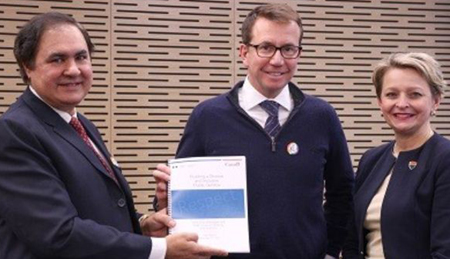March 8, 2018 marks the 107th anniversary of International Women’s Day, which was first held to commemorate the 1857 strike that led to the formation of the International Ladies Garment Workers Union.
That rally is a reminder that the advancement of women and the achievement of equality regardless of gender is a matter of human rights and a condition for social justice and should not be seen in isolation as a women’s issue.
As members of PIPSC, we can be proud that our union has a strong track record of supporting gender parity.
As early as 1979, 12 years after becoming a bargaining agent, PIPSC filed pay equity complaints against the employer with the Canadian Human Rights Commission.
In 1995, the Treasury Board and PIPSC settled complaints affecting 1,700 members in three bargaining units. The employees’ pay equity adjustments totaled close to $72 million.
PIPSC supported a landmark eight-year pay-equity battle that, on July 3, 2012, resulted in approximately 1,000 health professionals being awarded a milestone $150-million settlement.
In 2016, President Daviau appeared as a witness before the Parliamentary Special Committee on Pay Equity.
The Institute was pleased to see our recommendations on pay equity included in the special Parliamentary Committee on Pay Equity’s subsequent report to Parliament.
The 2018 Federal Budget’s commitments to pay equity and improved parental leave are steps forward for gender equality in Canada.
This year the government will introduce pay equity for workers in federally regulated sectors. The Institute is ready to work with the government to end pay discrimination and bring Canada in line with human rights legislation as well as international commitments made under the ILO Convention 100.
This week, the Institute released a report, Women in Public Sector Science: From Analysis to Action to focus attention on challenges faced by women in science careers in the federal public service.
This initiative is part of the Institute’s efforts to strengthen diversity and inclusion in our union and in the broader public service.
Furthermore, the Institute has achieved a Memorandum of Agreement with Treasury Board for a joint working group on workplace support for members affected by domestic violence. Our working group is now preparing recommendations to the Employee Wellness Support Plan Committee. This initiative has the potential to effect change in the Canada Labour Code.
Gender equality is enshrined in the Canadian Charter of Rights and Freedoms.
And yet, despite the slow but steady progress made towards gender equality, the World Economic Forum reported in 2017 the gap between men and women across health, education, politics and economics widened for the first time since records began in 2006.
We need to pay attention to the gender gap not only because such inequality is inherently unfair, but also because research shows gender parity is fundamental to determining whether and how economies and societies thrive.
Ensuring the full development and participation of half of our total talent pool has a vast bearing on the growth, competitiveness and future-readiness of our economy and our society.
It is our moral responsibility as individuals who care about human rights to advance the lives of women and girls everywhere, and to reverse the widening gap.
Across Canada, events and celebrations are taking place for International Women’s Day, and we invite you to participate.
Click here to find an event in your area.
We have achieved a great deal over the years – fairer salaries and benefits, rights and respect both inside the workplace and outside of it.
But we can do better together.





 area, just
area, just 

